#private opinion: banana fish another story
Explore tagged Tumblr posts
Text

PRIVATE OPINION: BANANA FISH ANOTHER STORY (1995) by yoshida akimi
#private opinion: banana fish another story#banana fish#ash lynx#blanca (bf)#okumura eiji#shoujoedit#shounenaiedit#oldanimeedit#*nikki#words
41 notes
·
View notes
Text
does anyone know if they print english translations of banana fish: another story or are physical copies only available in the original japanese?
#banana fish#banana fish: another story#private opinion#angel eyes#fly boy in the sky#yoshida akimi#akimi yoshida#banana fish manga
19 notes
·
View notes
Photo

#another story#angel eyes#光の庭#garden of light#private opinion#うらbanana#ura banana#fly boy in the sky#banana fish#バナナフィッシュ#yoshida akimi#吉田秋生#shogakukan#小学館#bunko cover#bunko kapağı#banana fish manga#banana fish türkçe#sade
50 notes
·
View notes
Note
Hello good day. Can i ask where to read manga of banana fish. Is their posibility have season 2. Its so painful watching this i cant accept ash died he deserve to be happy with eiji. In manga have a garden of light there. Why not in anime dont have episodethank you..
I've not read the manga in a very long time so I'm not sure where to read it online.
So let's talk about why Banana Fish is never getting a season 2 and why they didn't animate the epilogue chapter.
Banana Fish won't be getting a season 2 because the manga is over and they adapted (nearly) everything. The closest we could get is if a studio ever adapted Yasha. Yasha is another manga by Akimi Yoshida following an entirely different set of characters years after the events of Banana Fish. Sing is featured, Yut-Lung is mentioned and Ash gets hinted at.
If you want more Banana Fish content, there's plenty of side content. There's Private Opinion, Angel Eyes, and Fly Boy in The Sky, which are all set prior to the events of Banana Fish. There's also New York Sense which is an album/art book of all the pictures Eiji took during and after Banana Fish (even spanning after the epilogue chapter, Garden of Light).
Garden of Light was published in the final volume of Banana Fish. It's set 7 years after Banana Fish and follows Akira, Ibe's niece, who comes to stay with Eiji in his home in New York as he's preparing to launch his photo exhibition.
Originally, many in the fandom thought we'd get a GOL OVA. This never happened and, now 4 years on, almost definitely never will.
IIf I had to guess why GOL never got animated, I'd say it was because of:
1) Time constraints
It's impressive that MAPPA managed to adapt a 19-volume manga into a 24-episode show. They were already having to cut and rush through things.
2) Wanting to keep the ending open to interpretation
The anime clearly wanted to keep the ending more "open." Whilst many will say that Ash dying is obvious in the anime too, it technically was never confirmed in the anime. After every episode aired, there was a little relationship chart showing who was alive, who was dead, and what everyone's connections to each other were. After episode 24 aired, the relationship chart changed several times. This wasn't usual. Normally, a new, updated chart would be released, and that was that. This chart originally showed Ash as dead, but later it showed that maybe he was alive.
(You can read the relationship chart here and all the changes made over the course of several hours after the final episode aired.)
Why would the anime do this?
It could be for marketing reasons. For example, after the show aired, people would look at newly released official art and speculate if it showed a post-canon Ash and Eiji together. It could be that someone on the team wanted to change the ending but couldn't because they weren't allowed to. They may have thought it would be better because this is such an old manga and it had never had an anime adaptation before then. So it wasn't important to do the story justice.
I really don't know the real reason, so this is purely speculation.
18 notes
·
View notes
Note
what are your thoughts on blanca? the fandom seems quite conflicted about whether they should like him or not because he did nothing to get ash out of his situation with dino and also told him to go back to him. i know what he did wasn't right, but i still can't help liking him for some reason 😂
Omg....I?? Never got a notif for this ask at all?! I dunno when this was sent or how late am I in responding, really sorry about this, anon.
As for Blanca, I personally don't hate him as a character. In fact, I like most characters in the manga except for Dino and Foxx.
As you said, the fandom is conflicted about this, and quite reasonably so. The biggest reason being that Blanca asked Ash to go back to Dino.
But thing is, what would've been the alternative, in that scenario, given the kind of power and influence Dino had over both Blanca and Ash? Blanca was a hired assassin, the very nature of his job was to never care about human life, whoever it maybe.
The one decisive option would've been : Blanca not accepting Dino's offer to hunt Ash in the first place, and I still wonder what made him come back? Blanca tells Ash that he wanted to see "how Ash had turned out". Was it simple nostalgia, or curiousity? We don't know.
But at that point, their options were either Ash doing what Dino told him in exchange for Eiji's life, or die fighting Blanca, Dino, and Yut-Lung and put his gang and Eiji in danger either way. I think even if Blanca hadn't verbally told Ash to go back, Ash would've done that anyway, since it was Eiji's life at stake. It was never about Ash being compelled to follow what Blanca told him to do, that decision was made the moment Yut Lung threatened Eiji's safety, and laid down the conditions for Ash.
I remember in Private Opinion, Blanca tells Dino that one day Ash was surely going to rebel, and that Dino better be prepared for it. The only inconsistency in his behaviour was him telling Ash in the manga, "I'm surprised you disobeyed Monsieur." But I think that's a little error on the author's part more than anything.
The other option would've been Blanca rescuing Ash as a kid, and both of them going into hiding for the rest of their lives. But then, the entire story of Banana Fish would've never taken place, would it? :")
Another option would've been Blanca actively going against Dino/Yut Lung (who had the whole mafia and Chinese gangs behind them, and could easily hunt down both Blanca and Ash if needed) and plot to rescue Ash out of the goodness of his heart. Again, not a remotely plausible scenario.
Blanca is a complex character. And yes he's a man with a lot of flaws. His whole past was extremely traumatic. He went through an inhuman training all his youth, and at the end, the only person he ever loved was killed by people more powerful than him. That is also another reason why he wanted to spare Ash that heartbreak, because at some level, he probably knew which outcome Ash would prefer, his own safety versus Eiji's.
Blanca basically put up a facade all the time, a cool, aloof, flirty exterior to cover up all the bad parts he hid. Remember how he was visibly shaken up when Yut Lung digs up his past to force Blanca to work for him?
And for that man to take an about turn to get involved in someone else's life? To care enough? That should've been unlikely, but he did. He cared enough about Ash to disobey Yut Lung and join the fight in the final arc, the fact which was crucial in defeating both Dino and Foxx.
And I think it's this coexistence of both the good and the bad and the grey areas in Blanca's actions that make him a good character.

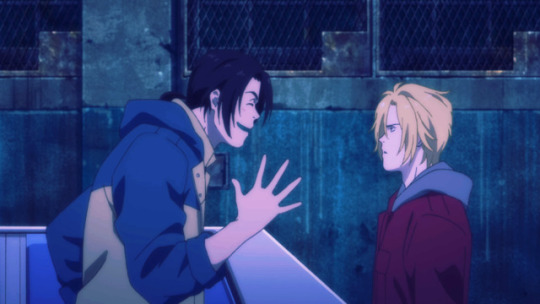

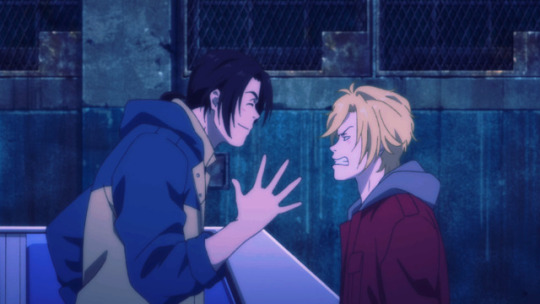
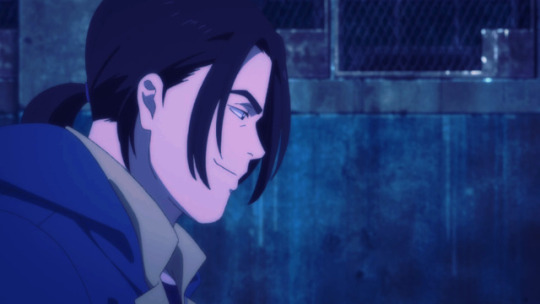
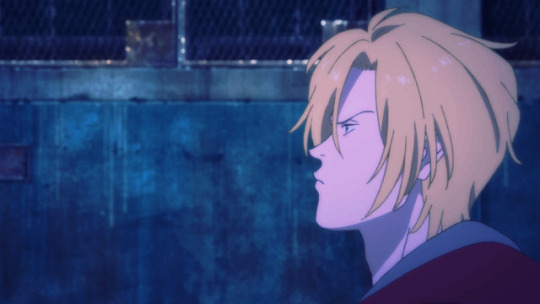
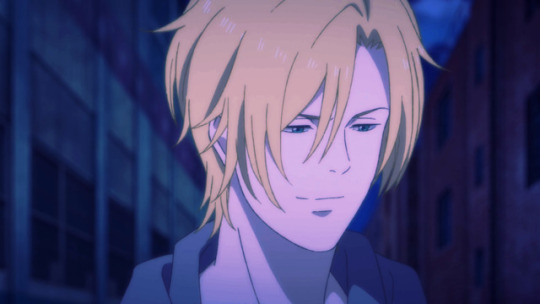

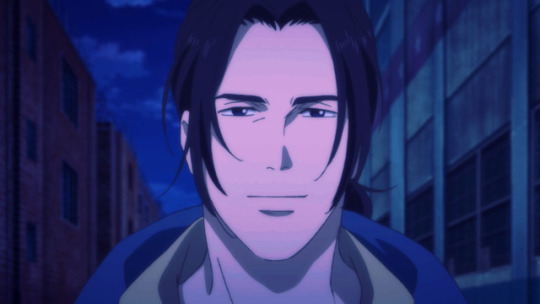
#banana fish#ash lynx#blanca#eiji okumura#asks#anon#yes yes I know the pics are old#but damn I loved this scene so much ;_;#bananafish#analysis#my posts#these are just my views obviously#and it's totally okay if you or others interpret Blanca's character differently :')
113 notes
·
View notes
Text
Ash and Recognizing His Innate Goodness
I’ve talked a lot about my belief that Ash was, from the very beginning, an innately good person, and that, while Eiji gave Ash something extremely special in giving him, for the first and only time in his life, the experience of what it felt like to be unconditionally love and accepted, I don’t think you can give Eiji, or anyone else in Ash’s life, credit for making him a GOOD PERSON. I think Ash just always was, it was just that his life was so hard and difficult from so early on, that he had to develop this hard, cold exterior as a way to protect himself. But it wasn’t something created in him through the kindness of others. I think the reason Eiji connected as deeply as he did with Ash is because Eiji was able to see past that armor and see Ash for who he really was. He saw how much pain Ash was in, how much it cost him to have to do the things he did, that he wasn’t some emotionless monster, and that he never was in danger of even becoming one. The one time the two of them really fought was when Eiji started to make the same mistake everyone else had made, thinking, because Ash was doing the things he was doing, it was because he was losing sight of his own humanity. The same way Shorter accuses Ash in Angel Eyes of becoming like the people who abuse him. Just like he was with Shorter, Ash is incredibly upset that Eiji would think that, and gets extremely angry, because it’s not true. It hurts Ash that Eiji could think that. That he could believe Ash could be someone who hurt others just because he can, or because he wants to. Ash isn’t killing Arthur’s men because he enjoys it, or because he wants to. He’s killing them because if he doesn’t, they’ll kill him and all of his own boys. He’s doing it because Arthur and the rest of them forced the issue by refusing to back down. Ash gets no pleasure out of what he’s doing. Just like he got no pleasure out of seducing Ricardo. It’s an act necessary to survival, and that’s all. Eiji eventually comes to understand that, and that’s the real turning point in their relationship. That Ash didn’t kill because he was a devil or a demon or a ruthless killer. That Ash didn’t kill because he was a bad guy. He killed because he had no other choice if he wanted to keep living and if he wanted to protect those he cared for.
There's so many things that point to Ash having an inherently kind and caring heart. The fact that he cares as much as he does about everyone around him, even before he really gets to know Eiji, like Griff, Skip and Shorter, and everyone in his gang. A good example of this is the fact that Ash is only working with Dino at the beginning of the story still because he needs the money in order to pay for Griff’s medical bills. Dino is Ash’s worst abuser, his longest abuser, and the last person Ash wants anything to do with. But he keeps working with him just so he can care for his big brother. He subjects himself to being around a man who raped him repeatedly as a child so he can have a way of keeping Griff safe and alive. This is the definition of self-sacrifice. This is before he ever meets Eiji. Definitely Ash was influenced by Shorter and Eiji, in terms of how he was able to open up and be outwardly softer and less harsh, but other people don’t determine for you what’s in your heart. They can’t create a capacity to care in another person. That has to be inborn. I feel like the fact Ash is as good as he is from the start of the story really proves he always had a strong, moral inclination. Really it’s in SPITE of all the horrific pain Ash has been through that he's as good as he is, because anybody with a shaky or nonexistent moral foundation, if they had gone through even a fraction of what Ash did, would have turned out viciously cruel. Yut-Lung is a good example, actually. Yut-Lung has been through similar experiences, though not entirely the same, as Ash, and he acts in ways that are entirely selfish and petty. Yut-Lung didn’t really have anyone in his life to help guide him, but even despite this, we see moments of regret and remorse in him, because he isn’t ENTIRELY without goodness. Still, he’s noticeably selfish, self-centered, petty and vengeful in a way Ash never was. Even at his lowest and most desperate moments, even when he was most alone, with no friends and no one to support him, Ash never hurt anyone who didn’t first hurt or try to hurt him, and he never hurt anyone out of spite, or jealousy, never tried to take anything away from someone just because they had it and he didn’t. Ash, from the very beginning, only ever acted out of self-defense. Even with positive influences like Shorter and Griff and Eiji, if Ash hadn't started out with having a strong, natural sense of right and wrong, given the truly massive scale of his suffering, he would have been a lot more morally corrupt from the start. The greatest tragedy of Ash, I think, is that he's really such a good person, who's been forced into such an awful, brutal existence through no fault of his own, and it's driven him to hate himself. I think the whole point of Banana Fish is to show the true damage that child abuse can cause. That it can take a good person like Ash and make him believe he's a bad person.
I think people can influence you, definitely, and can influence the way you turn out, but I also think there's an equal balance between nature versus nurture. I don't think you can create a strong moral nature in someone if it doesn't exist from the start. It’s why you can find genuinely bad people who have never experienced anything traumatic in their lives, and they still go out of their way to cause harm to others. Like basically everyone in the story who abused Ash. It’s also why you can find people who have experienced truly traumatic things, and they’re still good people deep inside, wanting to do the right thing, even if they’re also damaged and maybe don’t always understand how to go about it. Like Blanca, and of course even more so Ash himself. If that goodness DOES exist from the start, other people can nurture it and grow it and give it a safe place to express itself, and that’s what Eiji and Shorter did for Ash. But you can't give a moral conscience to someone who doesn't already have it. Kind of like you can't create talent or intelligence in someone. They have to be born with it, and then you can develop it. I just think, with everything we know about Ash, about the way he was from the start, the way he reacted to things, the things he tried to achieve, like keeping his friends and family safe, even trying to spare enemies of his, trying to break free from Dino, etc… and the things he didn’t ever care about, like money and power, the way he cared about people, the value he placed on human life, despite all the hell he'd been through, etc... it shows that he always had a good heart, he just lived in a world where if he let that show, it would get him killed. Which, the most tragic thing of all, it eventually did.
One more point to make about all of this is a parallel we see between Private Opinion and Angel Eyes. There are scenes in both stories in which Blanca and Shorter see Ash smile and laugh genuinely, in the carefree, childlike way children do, and they're both struck by how sweet and cute Ash is. Because they're seeing Ash as he really is in those moments. This sweet, adorable little boy. They’re amazed and stunned, because it’s the first time they’re actually getting to see the real Ash, and it's so at odds with the detached, uncaring facade Ash usually wears. Ash shows that part of him to them in moments of lighthearted, carefree abandon. He smiles and laughs like that around them after he's come to realize he can trust them, and that they won't hurt him.
I think what's important to remember is that, as horrific as the abuse Ash suffered is, and honestly, it’s about as bad as it can possibly get, it never defined WHO Ash was.
The abuse he suffered destroyed his life. Absolutely. It ruined his life. It changed, irrevocably, the course and direction of where he ended up. It changed and affected the way Ash interacted with people and situations. It altered and affected the way he behaved. It forced him to harden himself, to become harsh and blunt, to cut himself off in order to survive, to push people away because he couldn’t trust them, and because he was thrust, through no fault of his own, into a desperate, cruel world of violence which made him dangerous to be around. It damaged him in permanent, irreparable ways, emotionally and mentally. Caused him to develop dangerously low self-esteem and other, deeply unhealthy habits and ways of thinking. It made him hate himself, made him think of himself as worthless and not deserving of love. It caused him painful and overwhelming stress and anxiety, and forced him to live in a constant state of fear and uncertainty, leaving him unable to ever relax, unable to stop, unable to be himself, unable to be a boy, unable to just LIVE. It affected and changed and dictated every aspect of his life.
But the one thing it never changed, the one thing it never altered, was who Ash was fundamentally inside himself. The abuse destroyed his life, but it never destroyed HIM.
Despite it all, Ash never stopped being a good person.
This is so vitally important to the story, I think. To realize this about the story. Ash's abuse didn't turn him into an abuser. It didn't make him a bad person. Ash says to Foxx, right before Foxx rapes him, that he can do whatever he wants to him, because it doesn't matter, because Ash's mind and spirit are his own. He's telling Foxx that no matter how badly you treat me, no matter how hard you try to make me like you, I never will be. I'll never be as ugly as you are. Ash never lost himself, despite the sickening hell he suffered, and I think that's exactly in line with the message of Banana Fish. That even if you've suffered trauma that's destroyed your life, it doesn't mean that trauma defines who you are. It doesn't mean that trauma has destroyed you, or made you a worthless person. That your trauma isn't WHO you are. It's something you've been through, maybe even something you can never move past, but it doesn't mean that's all you are as a person. It doesn't mean that's what you are as a person. That bad things happening to you don’t make you a bad person. They may affect the way you act, the way you behave, the decisions you make, but it doesn’t change what’s in your heart. And Ash’s heart was always golden.
21 notes
·
View notes
Text
On Banana Fish’s Ending
Welcome to the hell that is Banana Fish’s ending. If you like it it’s hell. If you hate it it’s definitely hell. If you’re like me somewhere in the middle but closer to “I don’t like this” it’s hell. We’re all suffering.
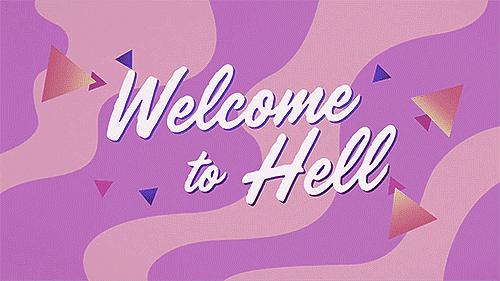
Like any useless writer, I cope by writing out my feelings so here, have this.
I can see why some feel the ending narratively works in some respects, and in some ways I can even agree it can be read in certain ways that make it work. But I also think a happy ending could have been just as narratively excellent, depending on the execution, and my personal opinion is that this would have been a more responsible ending. But no one has to agree, and I understand why people hate the ending and why people defend the ending.
I’m going to talk about this in a few segments: authorial statements, social messages, and genre. (I’m writing another meta on the narrative themes of the ending because that section got massively long.) For what it’s worth, a story does not exist in a vacuum, and while it’s absolutely valid to interpret and critique a story according to simply the written story, it’s also valid to weigh authorial intent (or to dismiss it), and to evaluate how the story plays into both larger cultural messages and larger literary trends. Any author 100% knows that their story will be interpreted according to all of these. But what follows is mostly my opinion/explaining why I feel as I do. It is not me saying anyone has to feel or interpret it the same way.
Authorial Statements
I know Yoshida has made... contradictory and, frankly, offensive statements on the ending, in which she’s said things such as that Ash narratively had to die because he was a murderer and people who kill need to pay with their own lives. In general, Yoshida seems to struggle in interviews--like saying she hates Yut-Lung when the story’s moral center character (Sing) literally tells him in his last scene “I can’t hate you” and promises to help him redeem himself. This is hardly unique to her. It’s hard to explain a complex element of story in a few sentences of an answer. Ishida’s first interview after the end of TG had some cringeworthy moments, Rowling seems to make constant missteps (and retcons), etc. Hence, I generally employ “death of the author”--I think the author’s intent matters to the extent their work conveys their intent, but not if their work contradicts what they then say.
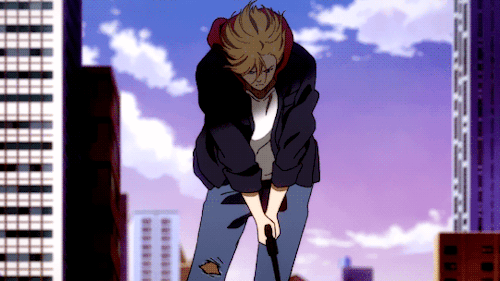
The entirety of Banana Fish contradicts this idea of murderous karma. In fact, the story is at its core about finding a way out of a violent cycle, of finding freedom. Ash dying with a smile on his face literally says that he did not die trapped in a system of karmic violence with no hope of freedom.
Not to mention Sing is a murderer. Yut-Lung* is a murderer. Blanca is a murderer. They all live, and get hopeful (even happy-ish) endings and implied redemption for Yut-Lung and for Blanca.
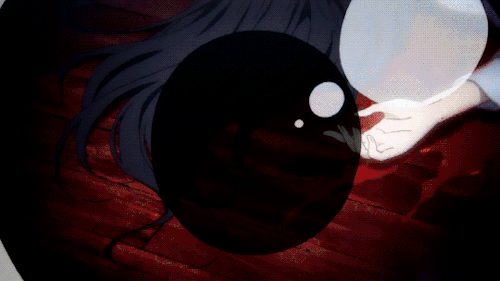
*I know Yut-Lung is name-dropped as having been assassinated in a later manga called Yasha but like, he never actually appears in Yasha and it has nothing to do with his character’s arc in Banana Fish, so I don’t think it’s relevant to anything relating to Yut-Lung’s character as we know him. It’s really just an Easter egg, and since Yut-Lung dying in Yasha is a retcon of the fact that his arc ending with him living in the main story (Banana Fish) I feel completely free to disregard it as not actually canon.*
Additionally, Banana Fish takes empathetic looks at children who are suffering in a world where they are forced into the roles of prostitutes and killers, and what’s the point of empathy if it can’t change anything? Eiji is noted to basically be walking empathy, having a gift for comforting those around him, and the mutual, spiritual, and yes, romantic, love he and Ash share changes things for Ash (and for Eiji). To say that death had to happen narratively is to say that Eiji was, in the words of his critics, useless, which is rather at odds with the central emotional draw of the story: Ash and Eiji’s relationship. It contradicts Eiji’s beautiful letter, the one that Ash smiled as he died because of, because in this letter Eiji assures Ash: “you can change your destiny.”
So anyways, regardless of what Yoshida says, Ash being a murderer is not a narrative justification for the ending because that simply isn’t what the story conveys.
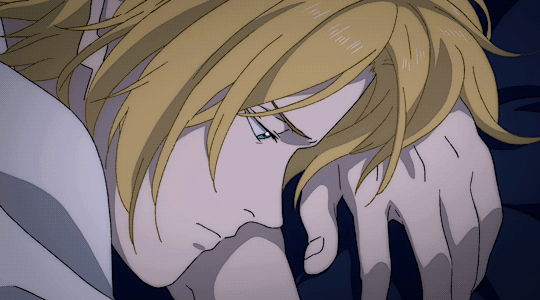
That being said, that perspective--that Ash’s death is karma for killing--is exactly Ash’s perspective. Just when he was about to overcome his flaw of not seeing his value by realizing how much he meant to Eiji, Lao reminds him of Shorter’s death, the one thing he cannot forgive himself for. And so Ash allows himself to die. But the thing is this perspective is wrong and narratively condemned. Eiji’s letter offers a counter to this, but Ash doesn’t take it (which is slightly inexplicable). Plus, as we see in “Garden of Light,” it leaves Eiji unable to completely overcome his flaw (an inability to act/truly live) for seven years, so the story condemns it too.
And, of course, Ash also did not kill Shorter out of malice--he was forced into it, like he was forced into the life he had to live with Dino. It’s not the deaths of one of the people begging to be spared whom Ash killed for playing a role in killing Shorter, but Shorter’s death itself that brings about fear and mistrust in Lao. To have Ash’s death be a consequence for killing willingly (which he did plenty of), it should have been for one of those nameless people we got a brief shot of, instead of as a consequence for a murder Ash had no choice in and was a victim of almost as much as Shorter was. But that also wouldn’t work because a nameless death doesn’t quite suffice for offing your main character, so. Yeah. Ash’s death is not a narrative consequence for killing others; it’s expressly framed as a tragic and cruel result of his inability to forgive himself for specific acts that were not his fault.
Social Messages Part 1: LGBT relationships
While Banana Fish was written in the 1980s-90s (kind of a dire time for LGBT+ people in the United States with the AIDS crisis), the trope of “bury your gays” has received rightful criticism since, and the ending can definitely be seen as “bury your gays.” (A criticism that is not helped by what happens to the gay/bi character in Yasha.) In other words, while I think the themes, characters, and frankly issues of Banana Fish are generally timeless, the ending is the only part of the story that I don’t think ages well. As time goes by, it will probably get even more criticism because of current society finally moving towards being better in the portrayal of LGBT+ characters.
*Because I want to complain and explain why I really don’t consider anything post-GoL canon: the follow-up picture book “New York Sense” doesn’t help the “bury your gays” impression either: Sing and Akira are certainly intended to be parallels to Ash and Eiji as Akira is brought to the US by Ibe and interacts with gangster Sing in “Garden of Light,” and while such framing is very ambiguous/bordering on not being there in GoL the follow-ups absolutely paint a romantic framing to their interactions in GoL. They marry and raise a son, popping up in cameos in Yoshida’s other works. Hence it runs dangerously close to reading as the heterosexual couple introduced in the epilogue got the happy ending while the gay couple we spent 19 volumes with did not. Since Sing is also still heavily involved with the mafia in all of the follow-ups, this again contradicts narrative justifications for Ash’s death as karma.
While I very much like Akira’s character, her romance with Sing isn’t just uncomfortable because of the above issue--it’s also uncomfortable because she is 13 and he is 23 in GoL (though their relationship doesn’t have to be read as mutually romantic there, and I don’t read it that way) and according to “New York Sense,” they marry when she is 18 which... implies things that seems very, very out of character for Sing, the series’ moral compass, and dramatically contradicts the skeevy adults preying on kids theme. It can also raise some cringe-worthy questions about why it’s framed as okay for the heterosexual couple but negatively (as it should be) for the people--who are primarily men--who assault Ash (and there is noted to have been a woman who assaulted him in “Private Opinion”). Like with Yut-Lung’s death, I just... don’t accept this retconning as canon. It contradicts the themes of Banana Fish as a story so I don’t have to.*
Social Messages Part 2: Abuse Survivors
For people who have been through abuse similar to Ash’s, in which choices over basic things like life, death, and your own body are taken from you, it’s honestly cruel to show someone who has spent their entire life suffering just about to grasp happiness, and then they die. It is fully valid to find this completely distasteful, and I do too.
But for me at least, one aspect that circumvents... some of the distasteful implication that Ash really was broken by things he had no choice in is the fact that Ash triumphed over his abusers first. Yet of course, having him die afterwards still hurts people who read the story and see themselves in a character like Ash, as it can reinforce the idea that abuse defines your life.
I do wish (though I don’t think there’s a moral necessity) that more authors/creators would acknowledge that, in creating characters whom you in theory want people to relate to, see themselves in, root for, care about, you’re asking people to suffer with them as they suffer and if they die, grieve for them. Given the heaviness of Ash’s arc and the specific nature of his suffering (especially since it was horrifically emphasized in the story’s last arc with Foxx), the fact that Ash didn’t in the end overcome the message that he did not have value is going to be very painful for readers/viewers. (Lao missed his vital organs, so Ash really chose to die instead of getting help, because he chose to believe Blanca over Eiji, which... I’m not sure it quite works.) If you could have narratively had it end happily (and it absolutely could have, and apparently Yoshida’s editor told her not to end it with Ash’s death), there’s room to say that going with the tragic ending is hurtful and bordering on irresponsible.
Genre
That defeat of Ash’s abusers is the reason I don’t think Banana Fish is quite as tragic as other stories like, say, the first Tokyo Ghoul or Hamlet or Macbeth, though it’s certainly tragic. In those stories, every single characters’ flaws lead to them dying, and it offers a cautionary tale. Banana Fish is more in the vein of say, Romeo and Juliet, or even the movie Titanic (I’m not making a romance comparison, for the record), in that the main characters might die, but their choices and the people they loved and how they loved manage to save a city, in the case of Romeo & Juliet, or to save Rose in the case of Titanic. In Banana Fish, Ash did help Eiji live, even if Eiji would need time to process it after the set-back of Ash’s death.
In other words, even if I’m unhappy with it and I am, I don’t consider Banana Fish’s ending nihilistic. It wasn’t “life sucks and then you die,” at least not to me. Life sucked, but it also meant something, even beyond Ash’s relationship with Eiji. Ash’s life had value. Through saving Sing in the story’s climactic battle, and then helping Max with that article that would save other child prostitutes, Ash saved younger versions of himself. That’s powerful. Not only that, but Ash found love and hope in his personal life as well with Eiji, Max, Shorter, etc., and through that genuine happiness. Even if he couldn’t fully grasp it, he knew it was there, and he died knowing there was genuine, true love, and therefore beauty, in the world too. And that, for me, comes across as far more hopeful than surface-level, cheaper happier endings. But still, the fact that Ash couldn’t fully experience this beauty and happiness because of the cycle of violence he had no choice about being involved in, plus a questionable character decision, does leaves a bitter taste in my mouth. (That questionable character decision, with the letter not having a full effect, makes tragedy seem a bit forced on Yoshida’s part.)
I want to quote Arthur Miller’s “Tragedy and the Common Man,” and I’ve highlighted parts I think explain how I feel about Banana Fish and Ash’s character (in particular, why I don’t think a tragic ending necessarily sends a nihilistic message, at least not to me):
The Greeks could probe the very heavenly origin of their ways and return to confirm the rightness of laws. And Job could face God in anger, demanding his right and end in submission. But for a moment everything is in suspension, nothing is accepted, and in this sketching and tearing apart of the cosmos, in the very action of so doing, the character gains "size," the tragic stature which is spuriously attached to the royal or the high born in our minds. The commonest of men may take on that stature to the extent of his willingness to throw all he has into the contest, the battle to secure his rightful place in the world.
There is a misconception of tragedy with which I have been struck in review after review, and in many conversations with writers and readers alike. It is the idea that tragedy is of necessity allied to pessimism. Even the dictionary says nothing more about the word than that it means a story with a sad or unhappy ending. This impression is so firmly fixed that I almost hesitate to claim that in truth tragedy implies more optimism in its author than does comedy, and that its final result ought to be the reinforcement of the onlooker's brightest opinions of the human animal.
For, if it is true to say that in essence the tragic hero is intent upon claiming his whole due as a personality, and if this struggle must be total and without reservation, then it automatically demonstrates the indestructible will of man to achieve his humanity.
The possibility of victory must be there in tragedy. Where pathos rules, where pathos is finally derived, a character has fought a battle he could not possibly have won. The pathetic is achieved when the protagonist is, by virtue of his witlessness, his insensitivity, or the very air he gives off, incapable of grappling with a much superior force.
Pathos truly is the mode for the pessimist. But tragedy requires a nicer balance between what is possible and what is impossible. And it is curious, although edifying, that the plays we revere, century after century, are the tragedies. In them, and in them alone, lies the belief-optimistic, if you will, in the perfectibility of man.
This applies to basically all tragedy, of course, but I think some tragedies are more hopeful than others. And I see that struggle in Ash’s, and a hope in Banana Fish that I don’t see in other more nihilistic stories. Ash fought to reclaim the humanity that people tried to deny him, and through Eiji realized his humanity was there all along.
Anyways, these are my complicated, all-over-the-place feelings on the ending. It’s fine for people to feel strongly either way, but also understand that when discussing such a heavy, fundamentally triggering work, it’s good to be sensitive to where people are coming from and interact with differing opinions with empathy. Many of us relate to characters like Ash, Eiji, and Yut-Lung, and since you don’t know where someone is coming from, let them express their feelings, and be kind.
I’ll post another meta on thematic impressions on Banana Fish later. But to each their own. Also please note, again, this is really just my opinion.
#ash lynx#banana fish#banana fish ep 24#eiji okumura#asheiji#yut-lung lee#yue lung lee#sing soo ling#shorter wong#lao yeon-tai#lao yen-thai#banana fish meta#banana fish ending#ramblings#akimi yoshida
632 notes
·
View notes
Text
The last 12 hours were a wild ride of emotions yet again in the Banana Fish fandom. And it wasn’t the first time in this story that we went through all 5 stages of grief within a few hours just to repeat the cycle shortly after.
The whole thing came down with the last episode airing or more like coming to the dreaded inevitable end that some of us (me included) hoped until the last second they averted somehow and do the biggest plottwist in plottwist history. Obviously it didn’t happen and Mappa stayed true to their word when they said they will stay faithful to the manga.
So last night we all went through “stage 1 - denial and isolation” where we all (at least those I talked to and read posts of) sat there crying our hearts out over the loss of a fictional character. (Please don’t get me wrong here especially since I’m totally on board with all of you. It took me 10 minutes to stop the sobbing and even longer to stop the tears. So I by no means try to belittle the reactions to this tragic end of a beloved character. I’m just in disbelieve over myself mostly that I can get so attached that I feel such strong and deep feelings over - and let’s face it - fiction! That as such is a huge proof of how capable Yoshida Akimi is when she can create a story that evokes such a big resonance even on emotional levels. That requires quite some skill. And Mappa translated this to animation in an extraordinary way. I’m drifting off though so back to topic.)
The same night shortly after we already moved on to “stage 2 - anger” seeing all those posts on social media expressing (for the most part) their disapproval for the ending which to my distaste peaked in insults and threats towards the creator and the animation studio. I’m willing to think that this is only a momentary feeling lead by anger because I want to believe that I’m dealing with reasonable people that know to behave and express themselves better than that usually. (Again, this isn’t the point of this post either.)
“Stage 3 - bargaining” already was scratched at some point (and extended while I was sleeping lol) because there were already discussions about how and why Garden of Light didn’t make it into the animation. There were voices of approval and of disapproval from all sides and while I must say that I do like GoL as it does give us closure of some sort, I’m almost happy or relieved that they didn’t animate it (yet). Yes, I think the animation made it a little more obvious compared to the manga that Ash actually died instead of just slept in the library but it still isn’t as ultimate as watching/reading GoL and be certain that this was indeed death. After all the manga as well as the anime without GoL does leave room for interpretation (even though a small one and I might be talking in denial here, but it is there). At least you can bend it enough to give fanmade sequels that include Ash without having it to be an AU some space to develop. Heck it even leaves a lose end to pick up for Mappa or any other animation studio buying the rights and continue close this story one way or another.
So not animating GoL might have been a deliberate decision by the animation studio Mappa for several reasons. Of course they knew what they were getting themselves into when they picked up this project as the end was not only already written but very well known to those who read the manga somewhere during the last 40ish years. Therefore the reactions regarding the story and it’s strongly discussed ending were known. They knew what was coming and yet stood strong to their word translating the manga to animation as is and did an amazing job at it (I’m not happy about the ending of that story at all but you have to admit that the show was a great piece of work. After all without the anime I would have never gotten to know the manga or the story in general and I’m sure I’m not the only one and I’m really grateful for that). And we have to keep in mind at this point that it’s not Mappa who decided on the ending but the creator Yoshida Akimi did 40 years ago. This is her story and we don’t know about contracts and copyrights and who has to say what about how the story may or may not be adjusted. Yes it is possible that Mappa might have had the chance to change the ending but didn’t, we don’t know that, but rumour has it that the staff wasn’t pleased having to produce the story with this outcome. (Apparently there was an interview of some sort where someone of Mappa stated this but I don’t have access to the source so I can’t say anything for certain. If I do get my hands on it will certainly edit it to this. That being said, if someone reading this has the link to first hand information I’d be so grateful if you could share it with me/us!) So taking this assumption into account I can imagine them deciding against GoL for just the fact that it leaves a small but existing open end that can be picked up not only by fans but professionals once the copyright is gone (Yes this would mean after Yoshida Akimi passed away and it wasn’t fixed otherwise in a contract somewhere. Not wishing her anything bad this means we most likely won’t see it anytime soon but from manga to anime was a 40 years gap so we can wait another 40 years, right? Bargaining right there...)
Anyways. Where I’m trying to go with this post is basically “stage 3 - bargaining” because what else might it be that I’m about to say? Maybe I’m still stuck in denial but please hear me out (if you haven’t left after this wall of text already lol)
With episode 24 the story should be over. Right? Maybe there’s room to adapt the prequels “Angel Eyes” and “Private Opinion” or the sequel “Garden of Light” but from all we know so far the anime was planned to conclude within 24 episodes and those were delivered. Topic’s over. Or is it? Well... part of the bargaining that started yesterday were the following screenshots of streaming platforms (thank you @cyberiin and @buy-goldbye for providing me with the screenshots as I have no access to those platforms):
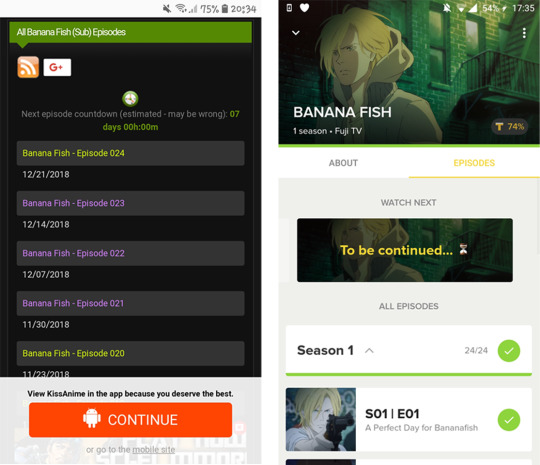
Clearly if the show is over the timers should have stopped and it most definitely should not say “to be continued”. I pushed that thought aside last night when I went to bed thinking that this is just an automated thing of these platforms and it will be gone once they update the information. So I went to bed with my broken heart thinking that this is the last image we get on the character relationship chart:
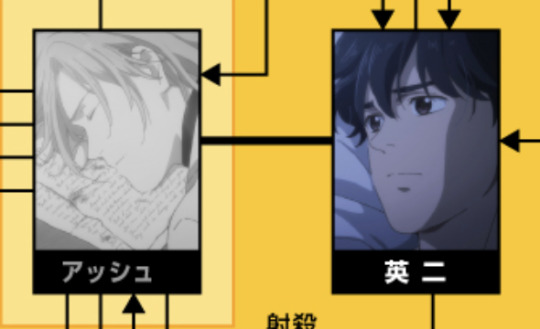
Only to wake up to an updated one:
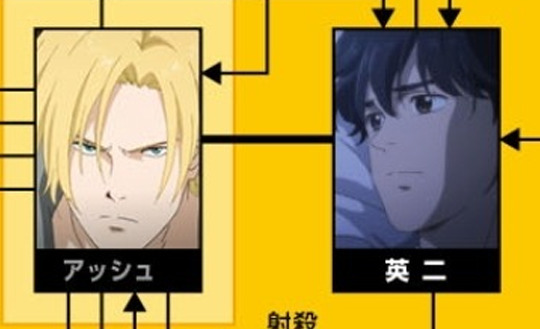
Different character picture. No longer greyed out as all the other dead characters still are (including Lao). Ash as stubborn looking as always refusing to obey anything or anyone (including his own death?). Name still greyed out but that changed while I was writing to a white name:
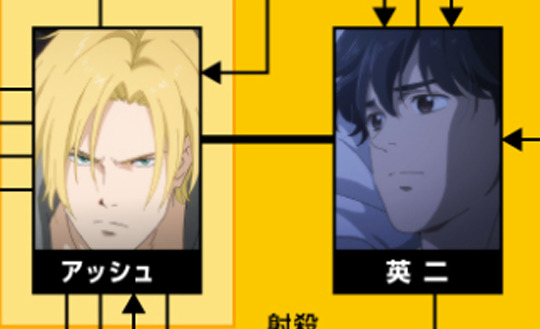
So needless to say that this is getting my hopes up but I don’t want to hope too much. At this point this can mean anything or nothing. Maybe this is just Mappa’s way of coping with the fact that they didn’t like the ending either but had to follow contracts (as assumed by rumoured statements talked about before) trying to solidarize with fans and giving them at least an open end. That of course only applies if what is rumoured actually is true. It might mean something entirely different of course but this only leads to speculations I have no basis for besides my hope that they will still turn this thing on us. Why I’m still hoping although the story is over? Well not only the character relationship chart changed within a few hours after Ash’s “death” but noone cared to stop timers either. Quite the contrary even IMDb is in denial with us and the fact that official media sites like these don’t update the information but leave it open says a lot in my humble opinion:
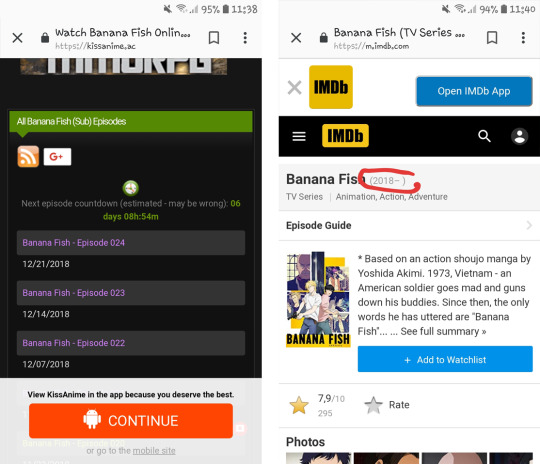
I don’t know what to do with the information. Nothing is confirmed at the time I’m writing this and this
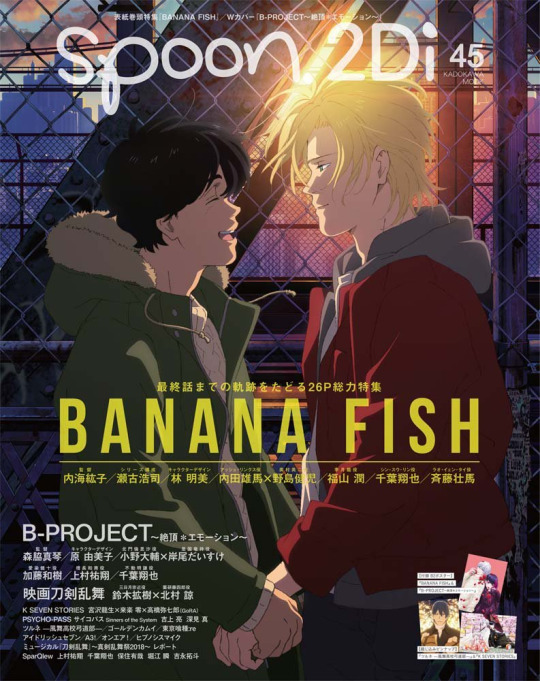
being published while I’m still typing isn’t helpful either. All of the above leads my naive mind and bleeding heart to the conclusion that there is a happy ending coming somehow but honestly all you can take from this is that apparently the show isn’t over yet and they still have something up their sleeve for us.
I’m sorry everyone that I don’t have anything profound to say or give you more insight than you already have. In the end this is just me rambling and ranting on about the current status quo and shouting out into the void in hopes my wish for a happy end will be granted.
How do you all feel about this? Come talk and share your thoughts. Am I delusional for believing in it still or are you with me? I’m curious! Let me know :)
366 notes
·
View notes
Text
Cape Cod - Banana Fish🍌🐠
Part of the charm of Banana Fish resides in the fact that it is like an epilogue of a story which was never properly told. We readers were invited to watch the final act of a tragedy, guessing what actually happened before, while whoever talks about the past doesn’t know the facts by first hand or, even worse, is an unreliable narrator. (info about unreliable narrator in fiction look up Wiki edit: I removed the link because the post doesn’t show up in the tags).
BF makes plenty use of unreliable narrators in a very sofisticate way. Compare those two fames:

I am not sure if “that lad” is Ash or Eiji (edit: I checked the Japanese and Dino’s line is “I know he {Ash} is sneaky, I doubled the security as precaution, if there is any suspicious move, the order is to shot and kill immediately) anyway what he said to Arthur is a lie because

Dino’s men still tried to caught Ash alive and wanted to use Eiji as an hostage. They didn’t want to kill either of them unless needed to save their own life. They are clearly still afraid that Dino might get mad at them if they shot the boy. Obviously if they can’t think of a scenario in which they aren’t dead they would try to kill Ash, but otherwise… Dino leaving his residence is suspicious too but I’ll let it for another meta.
Now let’s go back to Cape Cod and Ash’s childhood. I know I am going to repeat some well known facts but bear with me a little and I hope to offer you an interesting prospective with my headcanon.
Ash’s mother left after his birth. She was the kind of woman able to force her way in Jim’s household (she chased off Griffin’s mother) and to leave the place later. Jim may be pathetic but he is straightforward. He shares none of the intelligence nor of the beauty of Ash. Ash must have taken after her. I think Jim was fooled and it should have hurt as hell. And Griffin took care of his brother to help his father to start anew, knowing that Ash was a painful innocent reminder of her. Ash was born on Aug 12th 1968 and Griffin left Cape Cod in 1973 (according to A private opinion). So Griffin left before the Bluebeard case. The newspaper that reported the case was of October 22th 1976 when Aslan was 8.

Judging by the clothes, the first abuse happened in a warm season when Aslan was 7: spring/summer 1976 could be plausible. Not a whole year of abuse then, perhaps only three months.
We know at least of two times in which Jim cared for Ash: he made the Jack-o’-lantern for him (another hint of his Irish heritage?) and dragged him to the police right after he was abused. Ash hasn’t been home since he run away, his father didn’t know he was in NY but Jennifer recognized Ash on the spot and Ash knew who she was and her connection to his father. My conclusion is that she was there at the time of the Bluebeard case too. And let me say that Ash may resent his father because he is a piece of shit but I can’t believe she would have let that happen again and again without taking action: she is quiet but not remissive. Jim lashes out at her but he seems to consider her opinion. The notion of a year of horror and Jim being an unsensitive father is weird, especially if we agree that Jennifer was here too. It can be one of these cases of unreliable narrator.
This is my version of the events:
June or late July 1976. Aslan came back home with evident signs of abuse. His father took him to the police. The abuser is a well known respected man: the child story is hard to believe and suspicion arose. They found out that the child lived on his own and came to the conclusion Jim neglected him, implying he was the abuser, instructed his child to blackmail that poor veteran and turned to the police when the man refused to pay. I bet Jim was flustered and worried at the same time. When he talked to Max in canon he sounds genuinely disgusted by the insinuation that his son could have seduced that man at the age of 7 and it makes perfectly sense if he glossed on them blaming him for that. Back then he planned to send Ash to his sister but somehow it wasn’t possible right away. He kept the child in the house as much as he could, but then school started again, he was still under suspicion of neglecting his son, he couldn’t help but sending him to school. In the meanwhile Ash turned eight. Jim gave the boy that terrible advice: if the worst comes don’t play the hero, make him pay and he will think that there is no need to kill you after. And so Ash did when it happened. Only that that time it felt worse. It worked in a way on the pain, it saved his life for the time being but the man made it clear it wouldn’t have been the last time. Ash was scared, but also wanted revenge, escaping wasn’t enough to him. Children have a stronger sense of justice after all. When his father said he was sending him away he rebelled. Perhaps it was a bad choice of words that made Jim think his son was OK with selling his body, perhaps he thought it was in his genes, since that mother of his was a rotten woman and he had it in his blood. Perhaps he wasn’t sure anymore who his son was. Ash’s rage passed undetected. Jim started badmouthing his son. Next time, when he had a chance, Ash got a gun and shot that man. And Jim felt guilty because he didn’t see it coming. In the end Ash fooled him as his mother in believing something else. Ash’s reputation in the town was ruined and Jim himself had played a role in it. This time he sent his son to his sister, but the boy ran away.
#Banana Fish#Banana Fish meta#aslan callenreese#aslan jade callenreese#akimi yoshida#Jim Callenreese
22 notes
·
View notes
Text
From BF to YASHA, Yoshida never changed.
[This article contains heavy spoilers of YASHA and Banana Fish]
[There're two bonuses at the end of the article. Please jump straight to the end if you only want to know some interesting facts (also with spoilers).]
[As I’m not a native English speaker, sorry to make you tolerate possible language problems.]
===========================
After reading YASHA, I realized how it inherits part of BF’s theme. Basically, it picks out the “mirrored” relationship between Ash and Yut-Lung, then elaborates it with the story of a new pair of characters: Sei and Rin. They are artificial genius twins (genetically modified) raised in very different conditions, which results in their different characteristics, like the two faces of the god Yasha. Other settings are very similar, such as conspiracy involving Japanese and US government, Chinese underworld forces, secret experiments, and beautiful but dangerous prodigies…
Here I try to explain the inner connections between the two series, and how YASHA further elaborates some of Yoshida’s main interests while creating stories and characters. It also talks a little bit about Eve’s Slumber, YASHA’s sequel. (There’s no full English translation of Eve yet so I haven’t read the full story.)
1 The objectified children
Many of YASHA’s core concepts can be found in one of BF’s extra stories, “The Private Opinion” (thanks for the translation here) which tells how Blanca met Ash for the first time and became his tutor. Published in 1996 (YASHA started in 1996), it serves as a bridge between BF and YASHA.
1.1 The objectification of a child. In the short story, the primary job of Blanca was not taking care of young Ash. It was a "project evaluation," to see if Ash was worth working on. If Ash failed Blanca's evaluation, Dino would send him back to his ill fate without hesitation. Here we understand that Dino didn’t train and educate Ash because of love (which was not clearly explained in the original story). It was out of utility as if he was treating a product.
It's also how Amamiya Kyoichiro treated Rin in YASHA as his adoptive father, who raised and Rin as a tool instead of a son.
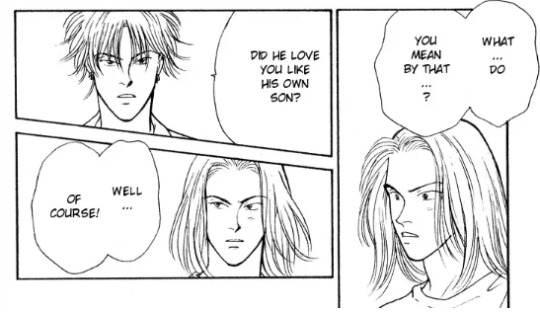
1.2 The artificial genius The short story reveals some of Blanca’s past. He was chosen as a child prodigy when he was young. After 15 years, only 18 out of 300 children survived, Blanca being one of them. Thus he tells Dino: “To artificially create an elite – that’s a saying of utter nonsense in the first place. Mankind isn’t strong to such an extent.”
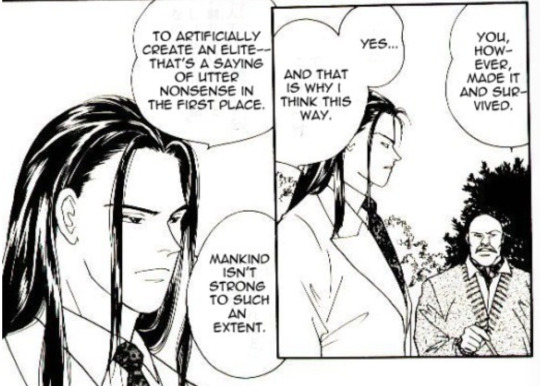
However, YASHA is precisely a story about the “artificial elites” and the problems they bring about. Sadly Blanca never appeared in the story, so we don’t get the chance to see his reactions about the matter…
2 The unqualified fathers
Although Yut-Lung and Rin are portrayed as opponents in the stories, they are not the real antagonists or villains. The “delinquent” fathers are the real villains in both stories.
Yoshida has a strong tendency to portray negative fatherhood. Even in her early work, “Kawa Yori mo Nagaku Yuruyaka ni (Longer and Softer Than River)” the absent father is the one who ruined the protagonist’s family and got him to where he is. In BF, we see at least 3 characters that claim to be the “father” of Ash: his biological father, Papa Dino and Max Lobo, and two of them are not doing a proper job. Eiji also comes from a family that the father is not functional (in "Fly Boy, in the Sky," his father has been sick for a long time so young Eiji was under a lot of stress, and Ibe was the one who helped him to get through.
In YASHA, things become even more apparent. We are presented with several unqualified fathers.
Amamiya Kyoichiro, the adoptive father of Rin, is basically a milder version of Dino. He is not a pervert, but a “control freak” who treated Rin as a good product. He isolated Rin from all others since childhood to prevent him from “wasting his talent” and uses him for his own goals. Once he found out that Sei was “better”, he would dump Rin without hesitation, which left Rin in utter desperation.
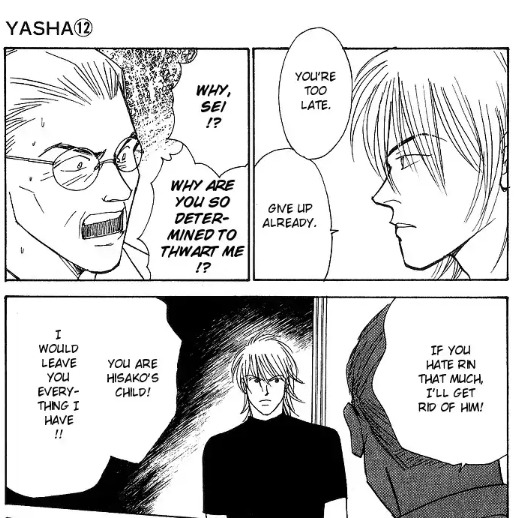
However, what makes the character even more interesting is his cowardice, not his power and wealth. Kyoichiro suffered from the violence of his own father - a tyrannical patriarch - for many years. The bravest thing he ever did was trying to get married with Hisako (Sei’s adoptive mother) without his father’s permission. For him, such “rebellion” or “sacrifice” gave him the right to control Hisako as if she owed him a debt, making the woman run away and steal baby Sei from the laboratory. Later, when Rin was abused by his father, Kyoichiro didn't dare to intervene. Because of his cowardice, Kyoichiro turned from a victim to a perpetrator, causing Hisako’s death and Rin’s twisted personality.
But, being the initiator of many tragedies, Kyoichiro kept doing what he believes to mean love. He tried to clone Hisako because she was “the perfect woman”. He was willing to offer Sei anything only if the kid went with his plan. And, like Dino, he finally gave his life to protect Sei (Rin), making him another complicated, mixed character. Love or possessiveness, who knows.
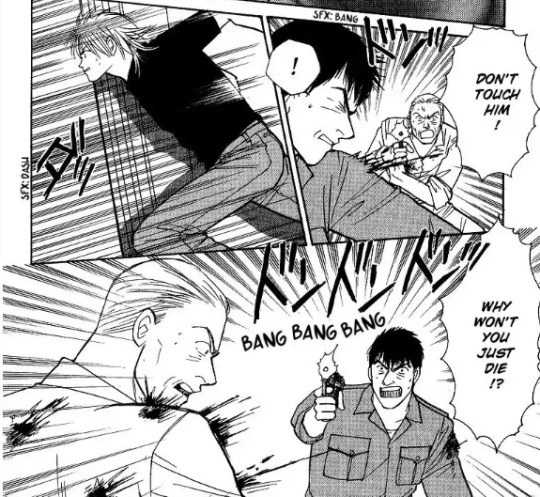
The fathers of the main supporting characters are no good either.
The father of Takeru (Rin’s partner) impregnated his mistress as his wife was infertile. Then he brought little Takeru back and let his wife raise him, causing the break-down of two women and the abused childhood of Takeru.
Ken’s stepfather was responsible for the suicide of his little sister.
The father of Raymond Goldberg was a violent pedophilia, and Raymond grew up to be exactly like him.
……
Among them, Takeru’s father was the only one who realized that they must stop passing on the tragedy to the next generation, which somehow helped Takeru escape from destruction.
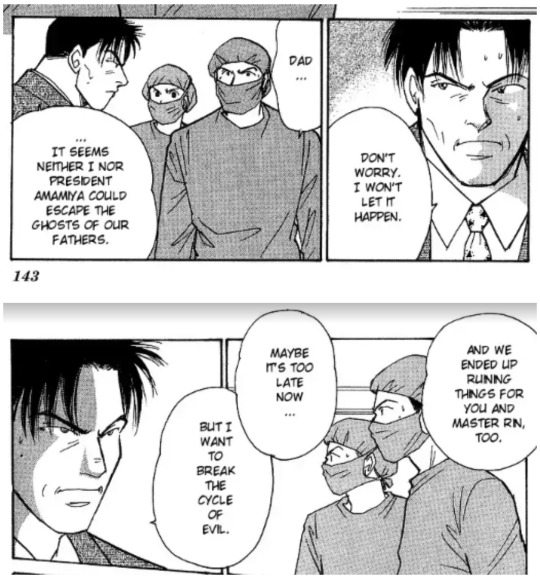
Personally, I feel that all these things make the ending of YASHA even harsher than BF. When Ash fell in the eternal dreams in the library, his soul was saved and filled with happiness. But Rin was staring at something that never belonged to him till the very last moment of his life, paying for somebody else’s mistake that had twisted his fate even before he was born.
3 The unconditional love
Love is another theme that Yoshida portrays in both BF and YASHA. What she keeps emphasizing is that the highest love is always “unconditional”. It’s something very close to “godly love”. It’s the way Eiji loves Ash, and the way Hisako loves Sei. Sei’s uncle Dr. Arisue, and his childhood friend Toshi also love him that way. “Love you whatever you do.” “Trust you under any circumstances.” – It’s a bit different from romantic love. In my personal opinion, that’s perhaps why Yoshida tends to deny the category of “BL” for BF, even stressed that Ash and Eiji’s relationship was “non-sexual” in “The Garden of Light”.
What would happen if people can’t love unconditionally? Perhaps the answer lies in Takeru’s question: “Why do people so easily become demons?”
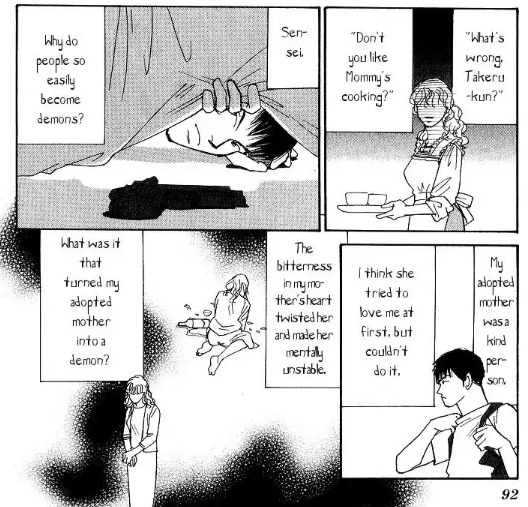
They just shouldn’t ask for anything in return.
===========================
Bonus 1:
It’s definitely not a good idea to be the protagonists in Yoshida’s works. Because they leave us, somehow, in some way, even in the next story.
As a main supporting character, Sing Soo-Ling is the luckiest guy. He lives through all three stories and even has a son (named Lie, with Ibe Akira).

Bonus 2:
According to the interview in the Official Guidebook of Banana Fish, Yoshida said that Blanca was initially designed to be a woman. She wanted to draw an affair between female Blanca and Ash, but the idea was stopped by the editor. (Thanks for the translation here.)
This is her illustration of female Blanca (photo by me):
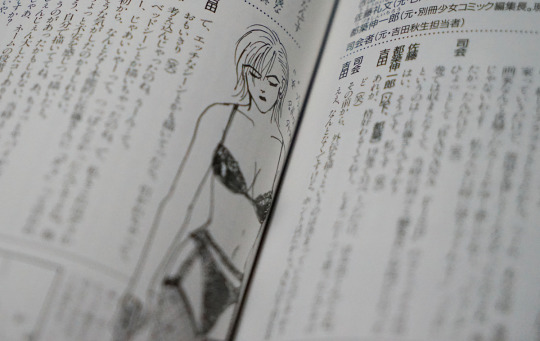
In YASHA, she finally got things done. What a persistent author… And that scene between Sei and Ru-Mei leads to the story of another sequel, “Eve’s Slumber” .
Fin.
R 2019-2
40 notes
·
View notes
Text

PRIVATE OPINION: BANANA FISH ANOTHER STORY (1995) by yoshida akimi
#private opinion: banana fish another story#banana fish#ash lynx#shoujoedit#shounenaiedit#oldanimeedit#*nikki#words
37 notes
·
View notes
Text
Trinidad & Tobago - Carribean dreams...
I am so ‘vex’ that I won't be ��liming’ in this beautiful place any more. I have been one lucky person to have been able to come here and hang with a local for almost a week. Jasmine has shown me her Trinidad and for that I am truly grateful. I have eaten so many local foods and they have all been fantastic. I have impressed the locals no end with my love of pepper sauce. The food here is tasty, spicy, and pretty much specific to this island. ‘Nah boy’, I am so very much enamoured with this country! One of my friends asked me if I had posted photos of the food. Truth be told, I don’t have a lot of pics, its not the most photogenic, and I seriously just wanted to eat it! I have partaken in the local speciality of doubles, with ‘plenty’ I might add - for those unaware that is with extra hot sauce and/or the mango bone that is infused with more pepper. Doubles is made with 2 baras filled with a curry channa (chick peas), it originally started as a breakfast food, progressing to be an anytime of the day food. It’s nutritious, tasty, and sold at street side vendors everywhere. Apparently even pizza and KFC taste better over here. This I can now say I agree with. Not sure if the food tastes better, or if its adding the ketchup, mustard, and pepper sauce that assists with the taste upgrade.....
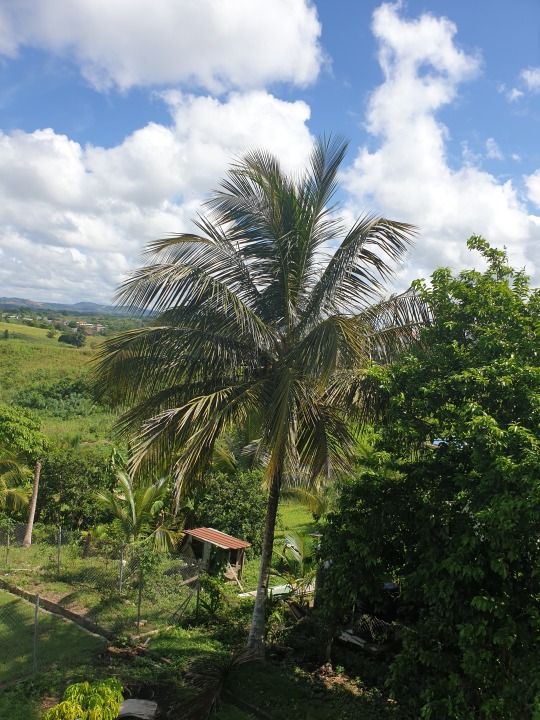
Jas took me to the home of street food a little town called St James, and made sure I got to have saheena, (seriously amazing spicy little deep fried spinachy deliciousness ) as well as alloo pie...amongst other things. The locals only really eat out at restaurants on special occasions so that meant Jas cooked for me a lot of the time, and wow, just wow. I loved the chicken curry (brown), smoked herring, baigan choka, salt fish, home made roti, the fabulous goat curry.... I could rave on, but google Trinidadian food and you’ll understand. Jas lives out in the ‘country’ to the South of Port of Spain, the capital. We spent one evening heading around to some of the local rum bars. Rum bars are everywhere here. Beer is cold and cheap (and made here - love the Stag and the Carib!). I got to meet a few of the locals. Over here they will buy you a drink even for something as simple as the fact that they had to order over you slightly. At the bar. They loved to meet the ‘white girl from Austalia’, as out here they dont see a lot like me... The good thing is none of it was them just trying it on with the foreigner. These are genuinely lovely, polite, caring people. I had a dance off with some girls from Venezuela, and ended up drinking way more drinks then I paid for, eating (they sell bar snacks and’cutters’ only at the rum shops) some tasty wontons at one place, and some really tasty fried chicken at another. We then got some free food from another lovely local who bought us a drink, and also then brought us across some Souse and Corn soup from his food stall (across the road from the rum shop). Anyway I can now say I have tried Souse, not sure I’d eat it again, it was flavourful, but pigs trotters in broth with onion and cucumber is not on my list of things to eat again! I think I have decided that I need to come back to Aus and start my own Trini food store, I think it’d be a huge hit. Love the local beers. Love the rum here. Jas made sure I tasted the Puncheon rum - 75 % and you never get a hangover or upset stomach... I wanted to bring some home, but alas no room in the suitcase! One of the biggest things, I was not aware that this is the home where Angostura bitters is bottled. It was first created in the town called Angostura in Venezuela by a German surgeon stationed in Venezuela, originally produced there between 1824 - 1830. In 1875, the plant was moved to Trinidad and that’s where it’s secret recipe is still produced today.
One of the main religions here is Hindu, they have a giant (85 feet - 26m) statue of Lord Hanuman Murti located in the grounds of Dattatreya Yoga. The statue is the second tallest in the world, and the tallest one in the western hemisphere. When we pulled up onsite there was one man looking after the bookstore who allowed us to enter the grounds and take photos. We weren't allowed to enter the temple/yoga centre as we weren't appropriately dressed. The gentleman then showed us the book explaining how the statue had been built and answered all my gazillion questions. It was like having our own private tour! Jas then took me down the road a little further to show me the temple in the sea. This temple was originally constructed by hand 1947 -52 by Sewdass Sadhu an immigrant from India. It has since been added to, and tidied up, but it's an amazing place, and a site of pilgrimage for Hindus. It's also one of the designated locations for Hindus to perform the funeral pyre. Hindu religion requires that the dead are burned near water and a holy place.
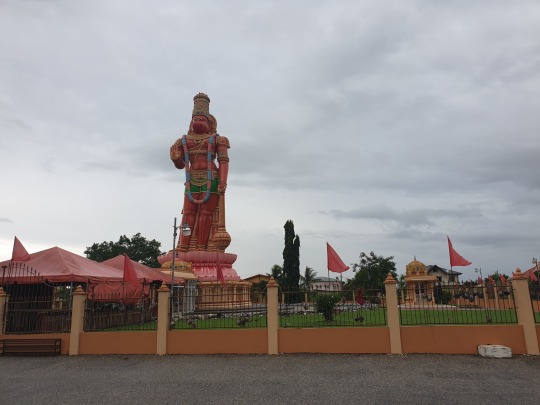

Brian Lara is still HUGE here. He is a home town Trini boy so I completely understand. Cricket is massive, and the new Brian Lara stadium is a huge landmark. They had a cricket game on when I was here (Trinidad vs Jamaica) but they had sold out the tickets otherwise we would have gone.
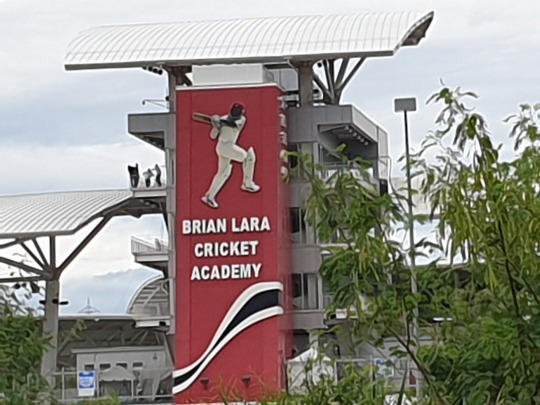
I spent a day at the beautiful Maracas beach, located on the northern part of Trini. On the way there we stopped at the lookout and had a quick look at the food stalls. I got to try some ‘Chow’, a garlicky spicy way of preserving such things as Pineapple, apple, mango, cucumber... its yummy and not too spicy and I really appreciated the stall holder giving me a taste ( and Jas’s friend Isabelle for buying some of the pineapple one). Maracas beach is a favourite with the locals and its a thing to do to have a ‘bake and shark’ when you go to the beach. Betcha cant guess what I had... Can I say amazing (again!!) You not only get your bake (which is a deep fried Roti) You get beautiful fresh deep fried shark fillet inside it, then you go to a buffet like area and add as many of the additions as you want . Yep, of course I added a bit of EVERYTHING . I had to taste it all. Seriously that thing was amazing. BTW I do taste everything first before adding pepper sauce... pepper sauce heightens the flavours. Jas’s friend Isabelle got her son in law to give us a shout out on the radio station he worked at ( they had it playing at the beach), so ‘Karen from Australia’ is now Trini Famous... love it!!
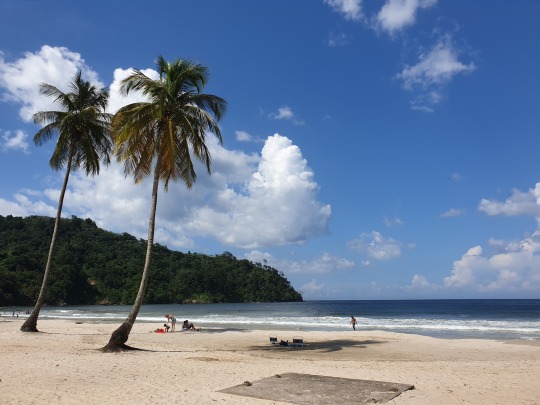
Jasmine took me out to the Pitch lake, in La Brea, and I’ll admit, I had no idea what it was ( I thought it was a lake!!) Anyway, some how we ended up with a colourful local as our personal guide, he was You tube famous and has apparently featured on David Attenboroughs visit to the lake. I have to sit and edit my ‘documentary’ when I’m back in Australia, it’ll be awesome.. I promise. Suffice to say the lake is the most amazing tar pit. Seriously amazing tar pit. The roads leading into the area are all like travelling over mini crazy hills due to the impact of the tar movements in the area. You have to use an authorised guide on the site, which is fair enough as a wrong step could see you disappear forever into the tar... literally... Trinidads pitch lake is the largest natural deposit of asphalt in the world (estimated to hold about 10 million tonnes) Its covers about 100 acres and is about 250 feet deep. There is a cool legend involving the origin of the lake the involves a hummingbird (I like the story), Historically Walter Raleigh re-discovered the lake on his expedition there in 1595. It has that charming rotten egg smell, and the mud and sulphur water apparently have healing properties. Locals were there immersing themselves in some of the pools while we were there. As we didnt have swim suits we had to settle with getting coated in the mud on our legs, and for me, also my face...lol!!! I didnt get a chance to put it on myself, out guide was very keen to smear it all over my face... (and shirt and hair.. etc...). Rinsing it, after it had set, was a whole other process involving splashing what looked Iike green water all over my face (and legs), all I wanted to do was rinse my face with some fresh water afterwards - and it took over an hour or so until I finally got somewhere to do it. Let’s not talk about how much scrubbing it required later that night to get the last bits of our skin! A great fun day though, made all the better for our colourful guide! I have had a crash course in some of the Trinidadian slang/words and between that and their accents I am sometimes lost in a conversation... (definitely accents particularly when you are trying to enter the country and the border control guy is talking to you and you have to continually say, sorry what??? ) I’m a lot better now!!


Jas couldn’t make it over to Tobago as she had work scheduled at her house that she needed to be around for. So I decided to head over for a night, hire a car, and see what I could see. Its literally a 20 min flight over (only costs about 50 US return) FYI 24 hrs isn’t really enough to see everything. I didnt get to the water fall or national park. I had headed down to Store bay beach when I first arrived with instructions to try the curry crab, conch and dumplings in Tobago (its their local specialty, amongst a few other things). Have to say I liked the conch, crab was over cooked and dry, and dumplings were kind of chewy. The ‘provisions’ that I got with it were really nice though - Plantain, Potato, green banana, avocado ..I would have liked to have tried another outlet to give a second opinion, but didnt have the time. I did get to the beautiful Pigeon Park, a natural reserve area, filled with some shops, water sports hire, beautiful beaches and glorious spot to watch the sunset. I also got out to the Fort of King George in Scarborough hiking up the giant hill to take in the glorious views. Hilariously there was a traffic hold up on my way there due to some goats being herded along the road. Island time boy. I would have to say, as much as its a part of the one country, Tobago island is completely different to Trinidad. Its a lot more touristy for a start, it has more servicible beaches. The roads are not as pot holed as Trinidad. The people are still lovely, but you get the tourist scouters who are looking to sell you on anything they can. Its a beautiful place and I’m so glad I got to go across and visit. As always, I can always go back!
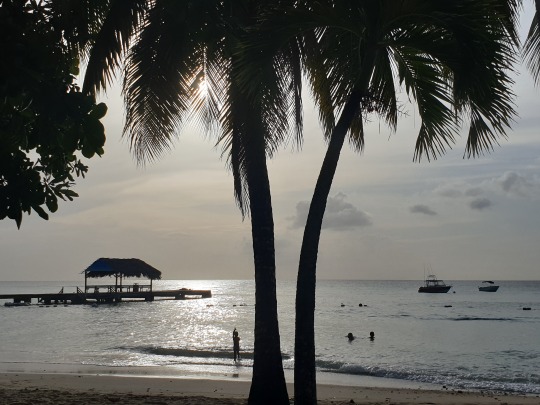
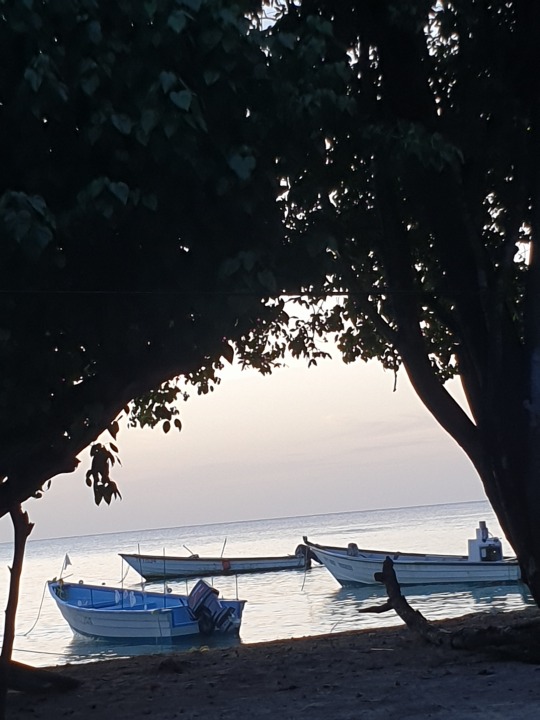

My time in the Caribbean has come to a close. (9-16 Oct). What an adventure. I have had a fabulous time, and recommend to anyone to come here and see this place, taste the food and meet the people for themselves. The country has their own issues with government corruption which impacts the improvement of infrastructure like roads etc. And there are warnings around safety as there are elements involved in crime that impact locals and tourists alike. This just makes Trinidad Tobago, not unlike a lot of other countries that I have visited on my adventures. It just means the more prepared you are to be open to new things, different ways of doing things, different cultures. The more you are aware of your own safety, and that of your belongings , the more you can avoid crime. Crime can impact you anywhere in the world, countries like this dont have it any more or less than others, it just seems to be in the media more....
1 note
·
View note
Note
Do you think BF is going to get another season, like a continuation of this season? I just feel like the anime wont be able to fit in everything that has taken place in the manga. It does feel rushed and I would have enjoyed the smaller parts where it gets more in depth of the background stories and reveals more about a character, like Eiji cursing or when he and Ash are having a bonding moment. I think leaving off on a cliffhanger at the hospital or Blanca could be a nice end and start part 2.
I don’t think they will Anon , they confirmed that the anime will cover whole manga. ( I hope that includes Garden of Light so I can cry myself to sleep for a week, I love to suffer *crys* )
The best side content we can hope for after the anime ends is a OVA or anime movie of Private Opinion and Angel Eyes and those are both prequels to Banana Fish. I would take any extra anime content.
If we had anime only movie content I wouldn’t complain just give me more Banana Fish.
I think they will add Blanca in the new OP so they will have to deliver on that arc in the anime.
29 notes
·
View notes
Photo

With the popularity of the upcoming anime, I decided to make a master post for fans new and old, as well as for those who are curious about the series! What is Banana Fish? Banana Fish is a manga series by Akimi Yoshida. Originally published in 1985, it follows the story of Ash Lynx, a charismatic gang leader, as he grapples with figuring out the mystery of “banana fish” that turns his life upside down. The story also centers around the close relationship between Ash Lynx and Eiji Okumura, a young Japanese photographer’s assistant who came to New York to photograph the city, but ends up getting caught up in Ash’s violent life. DISCLAIMER: Banana Fish is definitely not for everyone. Some of the topics Banana Fish deals with are violence, drugs, rape, pedophilia, child abuse, gang warfare, racism, prostitution, and death. None of the sexual content is shown explicitly. I recommend not investing in this series if these topics make you uncomfortable.
Manga - The main story consists of 19 volumes. VIZ Media licensed a english translation in 1999-2002, with flipped L to R pages and censored dialogue. VIZ later released a full re-translation of the series of all 19 volumes. Both have since been out of print. Can be read in full here, in English. The manga is also getting a gorgeous box edition which can be found on Amazon. (Japanese only)
Side stories - An extra volume, titled Banana Fish: Another Story consists of five side stories that take place before and after the events in the main story. Highly recommended to read after you finish the main story. Raws
Angel Eyes -prequel that tells the story of how Ash and Shorter met. Included in VIZ’s translation of Banana Fish.
The Garden with Holy Light - Epilogue to Banana Fish. Included in VIZ’s translation. Private Opinion - Prequel that tells the story of how Ash and Blanca first met. Untranslated. Fly boy, in the sky - Prequel that tells the story of how Eiji and Ibé met. Untranslated.
Ura Banana - Short, comedic story about Ash and Eiji discussing fan mail with Akimi Yoshida. Untranslated.
Media Anime- A Banana Fish anime is in the works! Set to premier July 2018, it is being produced by the studio MAPPA and will consist of 24 episodes. The biggest change will be that the story is set to modern day. You can find more information here on ANN. The first episode is scheduled to air on July 5th, 2018. UPDATE: Banana Fish is now available to watch on Amazon Prime globally Radio drama - A radio drama for Banana Fish was produced in 1996. @bananafishlovers was kind enough to compile the drama CDs into a playlist which can be found here. Untranslated, but you can follow along with the audio if you have the manga close by. Stage adaption - A stage adaption for Banana Fish was produced in 2012. Very hard to find outside of Japan, here’s a preview (Warning: stage silliness) Asrun Dream - A song from the album Mars by Gackt. In an interview with Akimi Yoshida, “Asrun Dream is an older song of his [Gackt], inspired by Banana Fish. He said that when he wrote it, he imagined Eiji asleep in bed while Ash looks out the window to the night sky.” (lyrics + source) Extras Angel Eyes - Not related to the side story of the same name, Angel Eyes was a Banana Fish art book by Akimi Yoshida. The short story, That Summer, is also included in the art book. You can read it here and here You can find copies of the book on Amazon or on Japanese bidding sites, but please be warned that the price for it has skyrocketed since it is a rare book. UPDATE: Angel Eyes is scheduled for a second printing, with more exclusive artwork of Akimi Yoshida’s planned to be included. Banana Fish REBIRTH - Official guide book to Banana Fish. This book includes an extensive analysis on the story and characters, and the setting of New York City. Harder to find than Angel Eyes, but also just as crazy expensive. I hope this covers everything. If you have any questions, suggestions, or corrections, let me know! I’ll also be updating this post as more information about Banana Fish is released.
563 notes
·
View notes
Photo

Iam in the Banana Fish Fever! so my poor Paypal suffers alot ,Tshirts Rebirthbook, Private opinion―Banana fish another story (別コミフラワーコミックス・スペシャル) ohmy and the Otomedia August 2018 japanische Anime Kultur Magazin
1 note
·
View note
Note
Hey hamlet! Thank you for answering my question. Sorry for bothering you but another question popped up in my mind. Why did Blanca not choose Ash’s side immediately? In the manga, it was shown that he sometimes chose his side and then with the whole mercenaries thing he chose Dino’s side. Why did he do that?
No worries, you aren’t bothering me!! I love answering asks on Banana Fish.
I think Blanca chose Dino’s side because he genuinely thought it was best for Ash. Blanca is someone who doesn’t want freedom in the same way as Ash: he binds himself to contracts and in many ways has given up on a life with love and hope post-Natasha’s death. Blanca is exactly what Ash does not want to become, but Blanca just wants to keep Ash alive more so than free. He’s never free, so he gives up on that and focuses on just keeping what he loves alive.


Natasha he failed to keep alive, and so then it’s Ash and then Yut-Lung. It’s not a coincidence the terms of his contract with Yut-Lung are that he will only protect Yut-Lung, not murder on whim.

He also pretty clearly chose to try to help Ash from within the system of contracts because it became clear to him that Ash was dying anyways in Dino’s care, and so to keep him alive he chose to help him. (I also don’t think he chose to protect Yut-Lung only to help Ash; he pretty clearly cared about Yut-Lung too.)

“Private Opinion” really establishes how Blanca really does love and care about Ash, and tries to protect him by breaking Marvin’s arm and teaching him to protect himself, but what’s tragic is that Ash is 14 in this side story. By the time of “Angel Eyes,” Ash is in juvie, Blanca is gone, and it’s only been a year. Ash also tells Eiji at one point that this girl he had a crush on was killed when he was 14... I think it’s likely that Blanca saw what happened, immediately flashed back to himself and Natasha, and left after that because it was too hard for him. Blanca is absolutely projecting onto Ash and Yut-Lung:

But Blanca realizes in the end that to keep Ash alive he has to work outside of the system too, hence why he breaks his contract with Yut-Lung (but still does what he can to protect him).



Blanca will break rules for people he cares about. Eventually. But he’s traumatized too and it takes him time to get over his cowardice and to realize that, for someone like Ash, there are things worse than dying: to stop projecting, really.


But Blanca is still unable to overcome his own self-hatred, even though he knows it’s self-defeating. He thinks people like him and Ash should be alone, but in the end he can’t even agree with that:

If Blanca had just said to Ash what he said to Yut-Lung... sigh. I really love Blanca’s character: he’s incredibly complex, and very, very morally gray, and I want to shake him.
382 notes
·
View notes